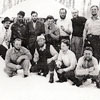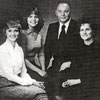Kaljo Põhjakas
 Kaljo Põhjakas was born in Tallinn, Estonia in 1923. He lived on his family's farm near Raasiku and attended school in Tallinn until he graduated from the Gustav Adolf Gymnasium in 1942. During the Second World War, to avoid conscription, he escaped to Finland. He joined the Finnish Army in 1944, the year an Estonian regiment was formed. He was wounded in a battle at Pupastvere and was transferred to Germany for proper medical attention.
Kaljo Põhjakas was born in Tallinn, Estonia in 1923. He lived on his family's farm near Raasiku and attended school in Tallinn until he graduated from the Gustav Adolf Gymnasium in 1942. During the Second World War, to avoid conscription, he escaped to Finland. He joined the Finnish Army in 1944, the year an Estonian regiment was formed. He was wounded in a battle at Pupastvere and was transferred to Germany for proper medical attention.
 At the end of the Second World War Kaljo lived in a displaced persons camp near Flensburg, Germany. In 1946 he was accepted to the Baltic University where he studied agriculture. The following year he immigrated to Canada working for Longlac Pulp and Paper Company as part of a ten month contract. Upon termination of his contract he moved to Vancouver. He returned to his agricultural studies at the University of British Columbia where he graduated with a degree in 1951.
At the end of the Second World War Kaljo lived in a displaced persons camp near Flensburg, Germany. In 1946 he was accepted to the Baltic University where he studied agriculture. The following year he immigrated to Canada working for Longlac Pulp and Paper Company as part of a ten month contract. Upon termination of his contract he moved to Vancouver. He returned to his agricultural studies at the University of British Columbia where he graduated with a degree in 1951.
He returned to the University of British Columbia in 1957 where he gained a Masters degree a short two years later. During his time in Vancouver, Kaljo became an active member of its Estonian community and played a fundamental role in establishing the post-war Vancouver Estonian Society.
 Kaljo joined the Department of Agricultural Research in Swift Current, Saskatchewan. He was a research scientist specializing in soil and water management. In 1967 he was offered a position with the Food and Agriculture Organization, a division of the United Nations. Along with his family he lived in Iran training local personnel. Upon the termination of his four-year contract he returned to Canada and found work at the Lethbridge Research Centre. In 1988 Kaljo was offered a two-year position in Egypt improving the soil in the Nile delta.
Kaljo joined the Department of Agricultural Research in Swift Current, Saskatchewan. He was a research scientist specializing in soil and water management. In 1967 he was offered a position with the Food and Agriculture Organization, a division of the United Nations. Along with his family he lived in Iran training local personnel. Upon the termination of his four-year contract he returned to Canada and found work at the Lethbridge Research Centre. In 1988 Kaljo was offered a two-year position in Egypt improving the soil in the Nile delta.
While living in Lethbridge the Põhjakas family associated with some of the other Estonian families living there, including Ralph Erdman, an important Estonian pioneer. Kaljo retired in 1988. He is married to Lilian and they have two daughters, Lea and Tiina.








